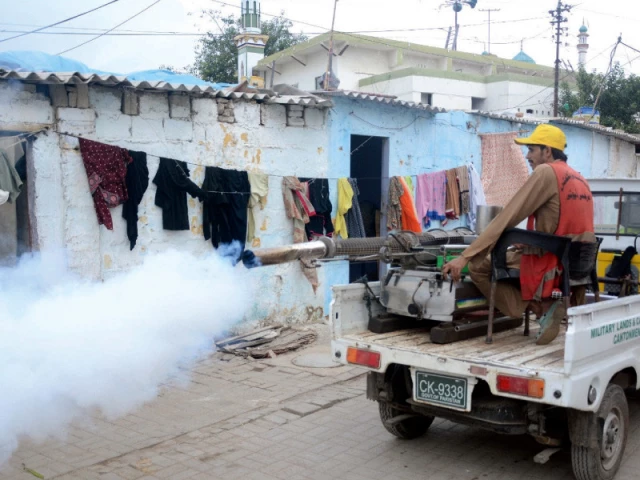Dengue alert issued, expected to last until Dec 5
Post-monsoon weather, stagnant floodwater raise serious public health concerns

The Pakistan Meteorological Department has issued a nationwide dengue alert, warning that the risk of dengue fever will be high between September 20 and December 5 due to post-monsoon weather conditions.
The alert states that dengue has become a consistent public health threat in Pakistan over the past decade, especially in the weeks following the monsoon rains. According to scientific data, the risk of dengue transmission is greatest when temperatures remain between 26 degrees Celsius and 29 degrees Celsius for five consecutive weeks and relative humidity exceeds 60 per cent. If rainfall exceeds 27 millimeters, its effects can persist for up to three weeks, further enabling mosquito breeding.
Mosquitoes that transmit dengue are most active within two hours after sunrise and two hours before sunset. Their reproduction rate only decreases when temperatures drop below 16 degrees Celsius.
Pakistan is currently experiencing widespread and destructive flooding due to prolonged and intense monsoon rains, overflowing rivers, and discharge from reservoirs. Large areas of Punjab and Sindh, including urban centres, are submerged. Numerous villages have gone underwater. Emergency shelters are overcrowded, and stagnant water combined with inadequate drainage has greatly accelerated mosquito breeding, raising the risk of dengue and other vector-borne diseases.
Based on historical patterns, current and forecasted weather conditions, and the presence of widespread floodwaters, the environment has become extremely favourable for a dengue outbreak. The risk of transmission is expected to rise significantly from September 20.
Experts warn of a potentially severe dengue epidemic this season, particularly in Pakistan's ten major cities - Karachi, Lahore, Islamabad, Faisalabad, Sialkot, Rawalpindi, Peshawar, Sukkur, Hyderabad, and Multan. The threat may also spread to other flood-affected areas.
All stakeholders, including district administrations, health departments, and the general public, are strongly urged to take immediate preventive measures to control the spread of dengue in vulnerable areas.
Health authorities and dengue control centres should remain on high alert. Large-scale fumigation and insecticide spraying campaigns must be carried out, especially in flood-hit zones. Stagnant water and blocked drainage systems must be cleared to curb mosquito breeding.
Citizens are advised to empty and remove any containers that may collect rainwater, such as old tyres, buckets, tarpaulins, or any similar objects. The use of mosquito repellents, mosquito nets, and coils should be ensured, especially during dawn and dusk hours. Doors and windows should be kept closed during peak mosquito activity times to reduce exposure.
























COMMENTS
Comments are moderated and generally will be posted if they are on-topic and not abusive.
For more information, please see our Comments FAQ